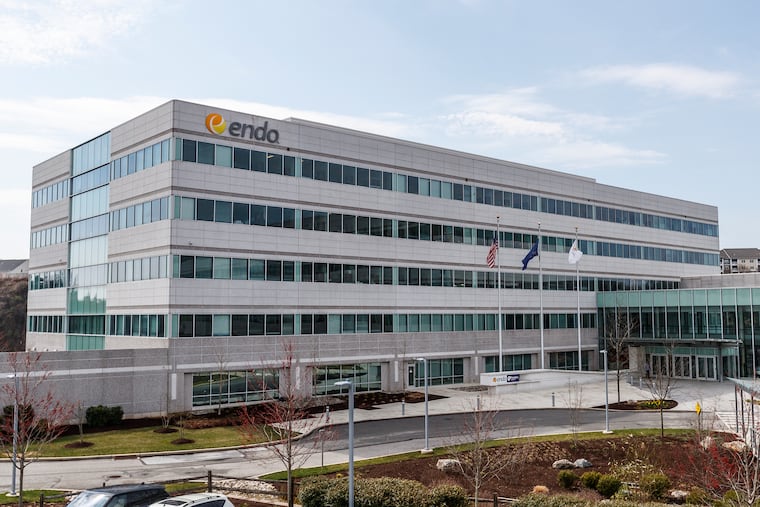Endo pharma agrees to $11 million settlement to avoid opioid trial
Endo, which has an operational headquarters in Malvern, is facing a trial in the first federal court cases targeting opioid makers and distributors over the public-health crisis caused by the painkillers.

Endo International PLC agreed to an $11 million settlement to avoid going to trial in the first federal court cases targeting opioid makers and distributors over the public-health crisis caused by the painkillers.
Endo said Tuesday that it will pay $10 million and donate $1 million worth of diabetes and allergy drugs to resolve claims by two Ohio municipalities that it helped fuel the U.S. opioid epidemic by illegally marketing its Opana painkiller. The deal resolves only two cases set for trial in October and leaves intact lawsuits against Endo filed by more than 2,000 local governments over its handling of Opana. The October trial will still proceed against other drugmakers.
The settlements come as a judge in Oklahoma is set to rule next week on whether Johnson & Johnson must pay as much as $17 billion to reimburse the state for tax dollars spent fighting the opioid epidemic. The case is the first designed to hold a drugmaker liable for the fallout from opioid addiction and overdoses.
Endo officials said the Ohio settlement didn’t reflect what it expects to pay to resolve the other opioid suits. “The cash portion of the settlement approximates the estimated cost to Endo of proceeding through trial,” Matthew Maletta, Endo’s executive vice president and chief legal officer, said in an emailed statement.
News of the settlement rallied Endo shares, sending them higher by as much as 33% in New York trading Tuesday before they ended the trading day at $3.02, up $0.47 (18.43%).
Other companies named in other opioid suits, including Allergan PLC, Teva Pharmaceutical Industries Ltd., and Mallinckrodt Pharmaceuticals PLC, also gained. Endo’s bonds due 2025 and 2023 spiked on the news, rising between 4 and 6 cents on the dollar to 62 and 67.75 respectively on Tuesday, according to Trace bond trading data.
Representatives for Teva and Mallinckrodt didn’t immediately respond to requests for comment on potential settlements. The Wall Street Journal reported Monday that the Irvine, Calif., based Allergan was in talks to settle the two Cleveland cases for about $5 million. Allergan officials declined to comment on the newspaper’s report.
The local governments’ cases are consolidated before U.S. District Judge Dan Polster in Cleveland, who has pushed opioid makers such as Endo and J&J, and distributors such as McKesson Corp. and Cardinal Health Inc. to settle.
Bloomberg News reported last year that Dublin-based Endo — which has an operational headquarters in Malvern — was seeking to negotiate a global settlement of all opioid claims against it. Those negotiations were separate from settlement efforts by rival opioid makers and distributors, people familiar with the talks said.
San Francisco-based McKesson and Dublin, Ohio-based Cardinal Health, along with fellow drug distributor AmerisourceBergen Corp., have proposed paying a total of $10 billion to resolve all opioid cases against the companies, according to people familiar with the talks. Lawyers for state attorneys general made a counter-proposal to settle the cases for $45 billion, the people said earlier this month.
A global settlement covering all opioid manufacturers and distributors may end up costing the companies a combined $30 billion to $55 billion, according to analysts at Nephron Research, an independent health-care investment research firm. Wells Fargo analyst David Maris said a final tally could be even higher, at almost $100 billion.
Lawyers for local governments were willing to allow Endo to get out of the Cleveland cases because they aren’t seen as a deep pocket in the opioid litigation, said Richard Ausness, a University of Kentucky law professor who teaches about mass personal injury litigation. Endo — dealing with $8 billion in debt — may be one of the companies forced into bankruptcy to avoid being engulfed by the suits, Ausness said.
“Bankruptcy has always been the elephant in the room when it comes to opioid settlement talks,” he said. “Some of the smaller companies like Endo may have no choice if the plaintiffs don’t offer reasonable global settlement proposals.”
Allowing Endo to resolve the two counties’ claims for a relatively modest $11 million also allows the municipalities to get “some of the smaller players out of the way” in a trial that could have more than 20 defendants, Ausness added.
The majority of Endo’s debt — racked up in a deal-making spree — comes due four years from now in 2023. Executives have been slashing costs and jobs as part of an internal reorganization. In March, the company refinanced bonds to push out debt maturities and give the company more flexibility.
At the heart of the suits against Endo and other manufacturers are claims that they downplayed the health risks of opioids and oversold their benefits through hyper-aggressive marketing campaigns. Distributors, considered to have the deeper pockets by plaintiffs’ lawyers, are accused of ignoring red flags about misuse of the painkillers and illegally flooding states with pills.
The case is In Re: National Prescription Opiate Litigation, 17-md-2804, U.S. District Court, Northern District of Ohio (Cleveland).
—With assistance from Katherine Doherty.